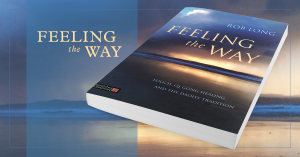 Following the recent release of Feeling the Way, author Rob Long participated in a Q&A with his colleague Shelagh Brady to discuss his new book and what ‘healing’ means for him.
Following the recent release of Feeling the Way, author Rob Long participated in a Q&A with his colleague Shelagh Brady to discuss his new book and what ‘healing’ means for him.
Shelagh Brady: So Rob, your new book ‘Feeling The Way’ has just come out. It’s about hands-on healing, Daoist-style, though apparently with your own ‘twist’. Can you tell me something about what inspired you to write it?
Rob Long: Certainly. The book is a distillation of various skills I’ve been developing in the clinic over the last twenty years, combined with my enthusiasm for all things Daoist. Some time ago I realized I had come up with something unique that I could pass on to others, but first I really wanted to put the whole thing together as a coherent system. A book seemed the ideal medium for this.
SB: What sort of skills and techniques are you referring to?
RL: I’ve called the system ‘Qi Sensitivity Healing – QSH for short. And that’s exactly what it is; a means of enhancing and using one’s ability to perceive qi in a healing scenario. It’s about being sensitive to dysfunction in another person’s energy field, right down to being able to experience individual meridians or acupoints. My main premise is that everybody has healing hands.
SB: So both the sensitivity to qi and the healing are achieved exclusively via your hands?
RL: The hands are the main tools, yes, but actually experiencing qi is a whole body experience. That requires a certain amount of discipline and mental focus.
SB: So if QSH is your own system, what is the Daoist angle in this?
RL: Well, there is nothing new under the sun, so this is just my personal take on healing touch, which after all is probably the oldest form of medicine known to mankind. The Daoist element is that QSH has deep roots in Qi Gong, and its entire theoretical basis lies in the traditional Chinese understanding of the human energetic anatomy – meridians, dan tiens and so forth.
SB: So why not just learn Qi Gong healing, such as practiced in modern-day Chinese hospitals? What’s different about QSH?
RL: Good question! Please understand that I have the greatest respect for (and also some training in) TCM-style Qi Gong healing. However, I was beginning to find it all a little… intellectual. Too rigidly diagnostic for my taste. My own experience in the clinic has always been that qi has this mysterious, literally indescribable quality. I began to wonder if I couldn’t just strip things right back to their earliest (and therefore Daoist) roots; really get back to a direct encounter with qi, where the intellect and any theoretical knowledge are temporarily put to one side. So QSH is not about what you know, it’s about what you can experience in any given moment, some of which is always going to be beyond words. That’s a very Daoist concept of course! Also, in QSH we don’t transmit qi to the patient. Healing comes about simply by being fully ‘present’.
SB: Intriguing… What else is different about your approach?
RL: The really big difference between QSH and other healing modalities is that it can be done as a stand-alone therapy, or at exactly the same time as another modality; in my case during an acupuncture or tui na massage session.
SB: You mean you actually apply the hands-on healing techniques whilst you massage, or apply needles?
RL: Absolutely. I very quickly discovered that practicing in this way made me much more aware of what a patient’s qi was actually doing, rather than what I theorized it might be doing. That breakthrough has made me a much more effective therapist.
SB: So it’s aimed at Acupuncturists, Tui Na masseurs… Who else?
RL: Actually any therapy that involves physical touch might well be enhanced by this; Shiatsu, Osteopathy or cranio-sacral work for example. Best still, you don’t even have to be a therapist! Remember, the main argument in ‘Feeling The Way’ is that everyone has healing hands. What you do need is some interest in ancient China, a strong desire to help, and the commitment to slowly but surely hone your skills. The book shows you how, step by step.
SB: Finally Rob, and you knew I was going to ask you this: does QSH really work?
RL: (Laughs): For that you’d have to ask my patients!
To read more about the book, please click here. To read Rob Long’s blog piece on his book, please click here.